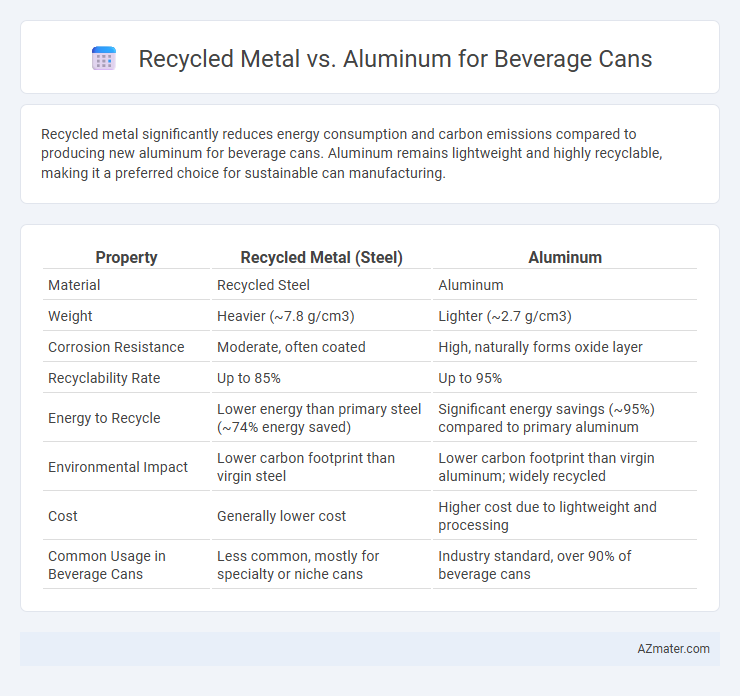Recycled metal significantly reduces energy consumption and carbon emissions compared to producing new aluminum for beverage cans. Aluminum remains lightweight and highly recyclable, making it a preferred choice for sustainable can manufacturing.
Table of Comparison
| Property | Recycled Metal (Steel) | Aluminum |
|---|---|---|
| Material | Recycled Steel | Aluminum |
| Weight | Heavier (~7.8 g/cm3) | Lighter (~2.7 g/cm3) |
| Corrosion Resistance | Moderate, often coated | High, naturally forms oxide layer |
| Recyclability Rate | Up to 85% | Up to 95% |
| Energy to Recycle | Lower energy than primary steel (~74% energy saved) | Significant energy savings (~95%) compared to primary aluminum |
| Environmental Impact | Lower carbon footprint than virgin steel | Lower carbon footprint than virgin aluminum; widely recycled |
| Cost | Generally lower cost | Higher cost due to lightweight and processing |
| Common Usage in Beverage Cans | Less common, mostly for specialty or niche cans | Industry standard, over 90% of beverage cans |
Introduction to Beverage Can Materials
Beverage cans primarily consist of aluminum and recycled metal, with aluminum dominating due to its lightweight, corrosion resistance, and excellent recyclability. Recycled aluminum saves up to 95% of the energy required to produce new aluminum from bauxite, making it a sustainable choice for can manufacturing. The integration of recycled metal in beverage cans significantly reduces environmental impact while maintaining material integrity and performance.
Overview of Recycled Metal Cans
Recycled metal cans, particularly those composed of steel and aluminum, play a crucial role in sustainable beverage packaging by significantly reducing energy consumption and greenhouse gas emissions compared to primary metal production. Steel cans are highly recyclable and can be reprocessed repeatedly without quality loss, while recycled aluminum offers an energy savings of up to 95% over virgin aluminum production. Both materials contribute to a circular economy in the beverage industry, with recycled aluminum leading in lightweight durability and steel providing superior strength and cost-effectiveness.
Properties of Aluminum for Beverage Cans
Aluminum used for beverage cans exhibits excellent corrosion resistance, lightweight characteristics, and high malleability, making it ideal for efficient mass production and transportation. Its excellent thermal conductivity aids in rapid cooling, enhancing consumer experience, while its non-toxic and non-reactive properties ensure beverage integrity and safety. Recycled aluminum retains these essential properties, significantly reducing energy consumption and environmental impact compared to producing aluminum from raw ore.
Environmental Impact: Recycled Metal vs Aluminum
Recycled metal significantly reduces energy consumption and greenhouse gas emissions compared to producing aluminum from raw bauxite, making it a more environmentally sustainable choice for beverage cans. Aluminum recycling saves up to 95% of the energy required for primary aluminum production, minimizing landfill waste and conserving natural resources. Choosing recycled metal in beverage cans supports circular economy principles by reducing mining impacts and promoting material reuse.
Energy Consumption in Production
Recycled metal significantly reduces energy consumption in beverage can production, using up to 95% less energy compared to producing aluminum from raw bauxite ore. Aluminum recycling requires only about 5% of the energy needed for primary aluminum production, making it an energy-efficient material choice. This energy savings directly lowers carbon emissions, enhancing the sustainability of beverage cans made from recycled aluminum.
Cost Comparison: Recycled Metal and Aluminum
Recycled aluminum for beverage cans significantly reduces production costs by requiring up to 95% less energy compared to primary aluminum, leading to lower manufacturing expenses. The price volatility of raw aluminum can impact cost stability, while recycled metal prices tend to be more stable due to consistent supply from scrap sources. Overall, recycled aluminum offers a more cost-effective and energy-efficient material choice for beverage can production compared to virgin aluminum metal.
Recyclability and Circular Economy
Recycled metal used in beverage cans significantly reduces energy consumption and greenhouse gas emissions compared to producing new aluminum from bauxite ore, enhancing sustainability within the circular economy. Aluminum's infinite recyclability without quality loss makes it a preferred choice for beverage cans, enabling continuous reuse and minimizing resource extraction. Both materials contribute to a closed-loop system, but aluminum's widespread recycling infrastructure and high recovery rates (over 75% globally) drive greater circularity and resource efficiency in packaging.
Performance and Durability of Cans
Recycled metal used in beverage cans often exhibits comparable performance and durability to aluminum cans, with aluminum offering superior corrosion resistance and a lighter weight that enhances portability and reduces shipping costs. Aluminum's high strength-to-weight ratio ensures cans maintain their shape under pressure, preventing leaks and preserving carbonation effectively. The use of recycled aluminum maintains these properties while significantly reducing energy consumption and environmental impact compared to producing new aluminum alloys.
Industry Adoption and Market Trends
Recycled metal, particularly aluminum, dominates the beverage can industry due to its sustainability benefits and cost efficiency, with recycled aluminum requiring up to 95% less energy than primary production. Market trends show increasing adoption of recycled aluminum driven by regulatory pressures and consumer demand for eco-friendly packaging, leading to higher recycling rates and more closed-loop systems. Industry leaders are investing in advanced sorting technology and supply chain innovations to maximize recycled content and reduce carbon footprints while maintaining product quality.
Consumer Preferences and Future Outlook
Recycled metal beverage cans appeal to eco-conscious consumers due to their lower environmental impact and reduced energy consumption during production, often favored over virgin aluminum for sustainable packaging. Aluminum remains popular for its lightweight, corrosion resistance, and recyclability, reinforcing its dominance despite fluctuating commodity prices and growing demand for green alternatives. Future trends indicate increasing innovation in recycling technologies and potential regulatory incentives, driving a shift towards higher recycled content in aluminum cans to meet evolving consumer preferences and sustainability goals.

Infographic: Recycled metal vs Aluminum for Beverage can
 azmater.com
azmater.com